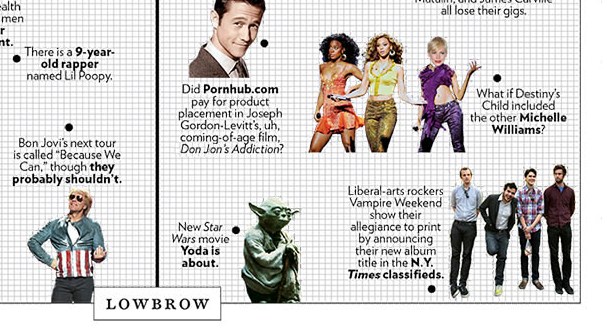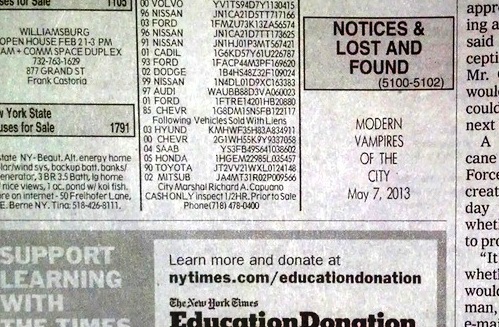I about wet myself after opening up the February 18 issue of New York magazine, after which I immediately flipped to the often imitated (but never duplicated) Approval Matrix. There it was, right down in the furthest corner of the Brilliant/Lowbrow axis:
Liberal-arts rockers Vampire Weekend show their allegiance to print by announcing their new album title in the N.Y. Times classifieds.
Don’t get me wrong: I realize we’re all media-savvy enough to recognize this sort of thing as a clever marketing ploy, and nothing more. But therein lies the basis of my excitement … and the overarching point of this post.
Let me explain by first saying that if you’re not familiar with Vampire Weekend, you really only need to understand that they occupy a fairly privileged perch in the modern-day pantheon of hip and artsy indie-rock bands. (Imagine the sound of four bookish Ivy League grads reared on post-punk and Paul Simon’s Graceland, and you’ve got the general idea.)
Incidentally, Vampire Weekend is also the sort of cross-cultural phenomenon that could appear in a Gap advertisement, say, or a fashion spread in Vanity Fair, without losing an ounce of its street cred. And so the fact that they would poke fun in such a way at the print medium—and not just print itself, but the print dinosaur known as the daily newspaper—and not just the daily newspaper, but the almost laughably out-of-touch newspaper artifact known as the classified section—immediately brings to mind two questions:
1. Is it perhaps the case that Generation Y-age readers see print—or more specifically, print newspapers—as so old-fashioned that joking about them is simply a matter of course? (Probably.)
2. And could it also be the case that after being considered so old-fashioned by the younger generation for so long, print is finally on its way to becoming ‘cool’ again—at least in the ironic sense of the word? (Perhaps.)
Then again, it’s certainly possible that I’m making way too much of nothing at all. But the fact that this story has been reported recently in publications with mostly Gen Y audiences, including Pitchfork, Buzzfeed and The Onion‘s AV Club, makes me think that I’m actually on to something. There’s also the telling fact that Vampire Weekend’s fans (or their Twitter followers, at least) were tipped off to the classified ad by way of a well-timed tweet:
What do you think? Was this just a cool marketing effort unleashed by a creative publicist? Or is it perhaps the start of something more? (And just for the record, I don’t think a minuscule publicity budget had much, if anything, to do with it. In the Times, after all, even a classified ad is pricey.)


































